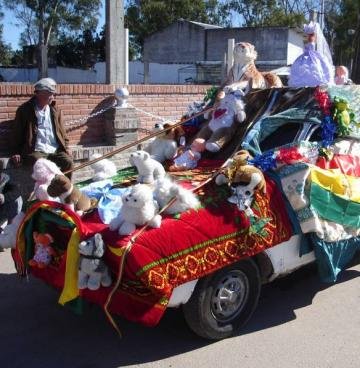Post-it City
dal 12/3/2008 al 24/5/2008
Segnalato da
12/3/2008
Post-it City
Centre de Cultura Contemporania de Barcelona CCCB, Barcelona
Occasional Urbanities. The research project focuses on the temporary uses of public space for commercial, recreational and sexual activities in cities around the world. This type of urban practice appears, moves and disappears, like a post-it stuck on a place that is important in passing but leaves almost no trace.

The Centre de Cultura Contemporània de Barcelona (CCCB) and the Centre d’Art Santa Mònica (CASM) present the exhibition POST-IT City. Occasional Urbanities. The exhibition forms part of the POST-IT project, directed by Martí Peran, which began in 2005 with a series of seminars and workshops at the Centre d’Art Santa Mònica in Barcelona.
The research project focuses on the temporary uses of public space for commercial, recreational and sexual activities in cities around the world.
This type of urban practice appears, moves and disappears, like a post-it stuck on a place that is important in passing but leaves almost no trace. This phenomenon highlights the different needs and shortcomings that affect certain groups in particular, and serves to salvage the value of public space.
Research into these types of occasional occupation of the city is based on two different viewpoints: emergencies that are forced to parasitize public space, and the capacity of citizens to optimize space, beyond its intended functions.
With this dual perspective as its basis, the exhibition presents the cases of 78 cities as varied as Tel Aviv, Buenos Aires, Hanoi, Santiago de Chile, Bologna and Barcelona. POST-IT City seeks to explore the phenomenon of occasional urbanities in their many possible variants, with a view to documenting and reflecting on them: an industrial estate that becomes a car racing track at weekends, the use of the city “under construction” for the adventures of explorer nerds, certain aspects of the squatter phenomenon, the use of waste land for occasional meetings (a traveller’s camp or a rave), the conversion of the daytime university city into an area for sexual transactions by night, etc.
This is a project which, with the wealth of parameters involved, presents us with a series of issues of particular interest for contemporary culture: the need to create available space, the versatility of the recycling concept, the emergence of new subjectivities, etc.
POST-IT City Network
The materials that go to form this first Post-it project are informed by a variety of sources and different working processes. The result is an archive of case studies, for the most part specially produced for the project. We then got agents in different world cities involved in the research work to ensure a hands-on approach and direct knowledge of the place.
To date, some 20 cities have taken part in the project. The agents on site each have a different profile (formal collective, university group, arts centre, individual researcher, etc.) and, consequently, their own particular ways of looking at the phenomenon. This means that there is no single register in the methodology underlying the archive.
Most of the teams are made up of young researchers. This is essential to the character of the project, as it demonstrates an explicit preference for the committed intersection of the different processes of forming, producing and circulating ideas.
POST IT City Workshop
On 13 March and 1, 8, 15, 22 and 29 April 2008, the exhibition’s consultation space will be the venue for a cycle of meetings with a view to reflecting on the condition of contemporary public space. Post-it case studies will be presented of cities such as Tel Aviv, Buenos Aires, Santiago de Chile and Berlin, with the participation of international specialists in the field by means of videoconferencing.
CCCB
Calle Montalegre 5 - Barcelona



